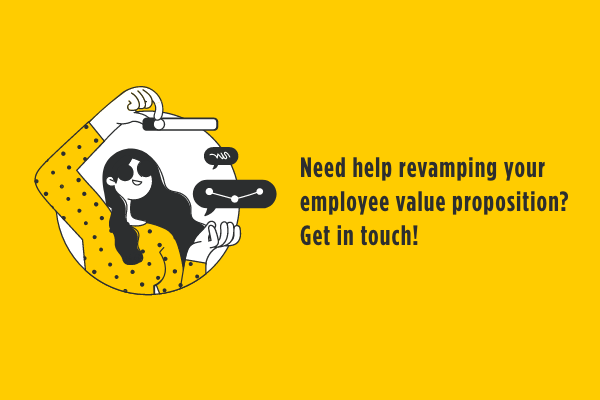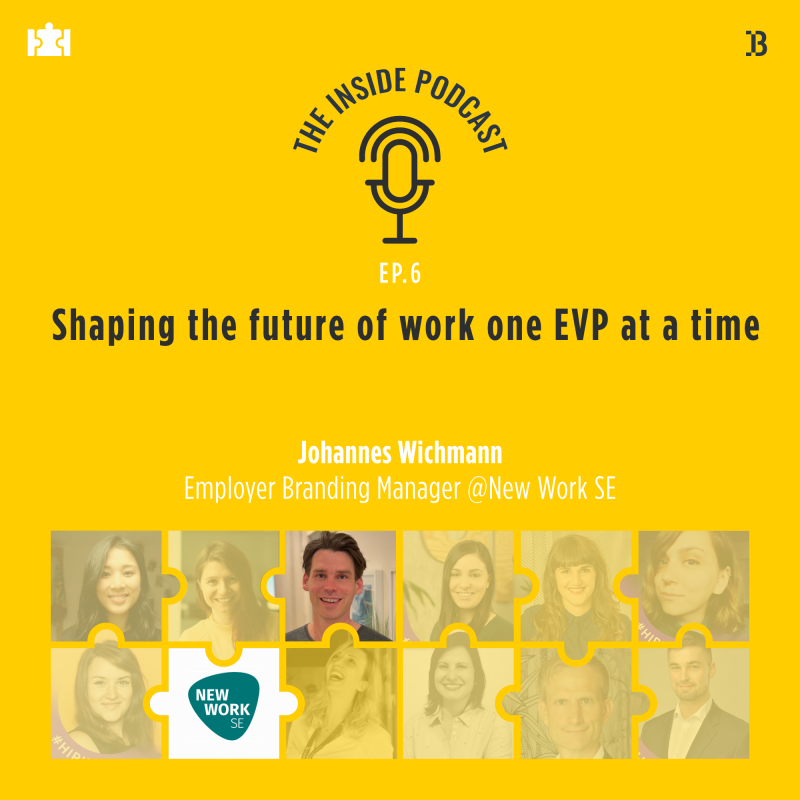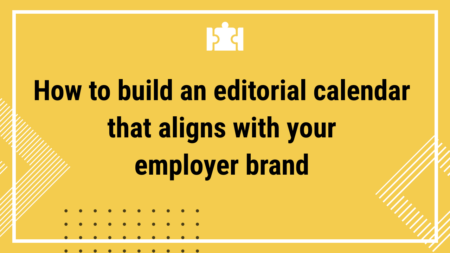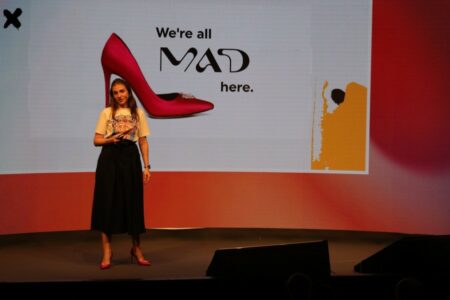Overview
Episode 6 of Employer Branding: The Inside Podcast is live on Spotify! This time around, we’ve had the opportunity to interview Johannes Wichmann, employer branding manager at New Work SE. Johannes shared with us some valuable insights on shaping the future of work, what it means, and what companies should be doing to master their employer brand activities. Employer branding is diverse, to say the least. Tune in to learn more!
What you’ll learn by listening
- Shape the future of work: what it means & how it is implemented
- What are the multi-facets of employer branding
- The link between employer branding & a company website
- What it means to have an open, flexible company culture
- Psychological safety in the hybrid workplace
- Context vs content in employer branding
- What is data-driven employer branding
About the company
“We believe in a world of work where people can find their true self and achieve their full potential. This not only makes individuals more satisfied and happier, it also makes companies more successful.”
Based on this conviction, New Work SE aligns its brands, products and services around its vision – For a better working life. We’re already seeing a paradigm shift in terms of what we call ‘work’. Demographic change is exacerbating the shortage of skilled workers, in turn shifting power away from employers and over to employees.
Digitalisation is not only revolutionising entire industries, it also enables people to work wherever and whenever they want or need to. And younger generations, in particular, are eschewing long-standing values in favour of more modern ones with a clearer focus on a positive work-life balance.
Podcast link – Enjoy listening to S02Ep6 of The Inside Podcast!
Podcast transcription
Georgiana: Good morning, everyone. This is Georgiana, from Employer branding: The Inside Podcast. We haven’t been in touch in a while, as we’ve been preparing some very interesting things and some super, super-nice guests. And my guest today is Johannes Wichmann, who is in charge of employer branding at New Work SE, Germany. Hi, Johannes! Welcome!
Johannes Wichmann: Hi! Thanks for having me on your podcast.
Georgiana: Before we dive deeper into what your company does employer branding related, please tell me exactly what New Work is about – because I know that it actually connects several companies – and what your role entails on a daily basis.
Johannes Wichmann: Yeah, well, my name is Johannes, and I’m an employer branding manager at the New Work SE, working from our headquarters in Hamburg. New Work is quite a young company. It was founded in 2019, but actually has companies or brands that belong to the New Work which exist for a lot longer than that.
There’s, for example, Xing, the Business Network, which, at least here in the DACH region, most people will have heard of, for sure. And then the other companies that belong to us, such as Kununu, which is an employee rating platform and Prescreen, which is an applicant management system. And then also brands such as InterNations, Hallo, Freelancer and of course, Honeypot.
As an employer branding manager for New Work SE, you actually have the pleasure to do employer branding for all those brands, which is really nice. And, yeah, we are quite an international company with offices in Barcelona, Valencia, and Porto. And of course, we also have offices in Vienna, Switzerland, and Germany. Basically, I do both internal and external employer branding. Currently, I probably do a bit more external employer branding with topics such as social media campaigns, or our careers website, optimizing the candidate experience. And another topic is also events and cooperations.
Georgiana: Got it. So, actually, the companies that are included in New Work SE are, so to say, people-related, right? You mentioned Kununu, Honeypot. Is there something that New Work does in terms of employer branding, that you guys replicate everywhere, across all of these companies?
Johannes Wichmann: Yeah, well, all the companies within the New Work umbrella, I would say they have basically one common goal, and that is to help create a better working life. So basically, all of our products and services contribute in some way or another to this, and there is already a shared vision to shape the future of work together; and to bring this whole new work movement forward.
But in terms of employer branding, what we probably share most across all our brands is our employee value proposition, which kind of reflects our beliefs, where we want to work and also what we want to communicate to the outside. And we try to create an environment in each of our brands where everybody can be true to themselves and be the person that they really want to be. It was in our EVP, we have those three core pillars, which are “Do what you really want”, “Build an inspiring team” and “Work on what matters”. We try very hard that those pillars find a way into every employer branding measure we do. I would say that it’s something you can definitely see across all our brands.
Georgiana: I agree. And actually, this is one of the reasons why I got in touch with you initially. I actually saw that you worked for quite a while as employer branding manager at Xing. And can you tell us a little bit about your experience there? And maybe what two of the most endearing projects during your time there were?
Johannes Wichmann: Yeah, sure. I’m not sure if I can actually pick two of the most endearing projects. But I believe that one of the things that are definitely very endearing or likable working as an employer branding manager at New Work SE is – at least from my perspective – the diversity when it comes to the projects you’re working on.
Employer branding is so diverse and it covers so many areas. And one day you might be creating a social media campaign and on the next day, you become an event manager organizing the next company event. In between your work on internal communication, and while you’re doing this, you come up with a new wireframe for a new feature on your Careers website. I believe this diversity, plus the diversity that you are actually able to work for different brands, makes it really interesting for me to work as an employer branding manager here.
In terms of projects, I would probably say that was the relaunch of our New Work SE company page. I liked it the most. I think it’s quite nice to see a website from its first ideas, from its first rough sketches, evolve into a functioning website with cool features. There are so many aspects of creating a website that is a lot of fun, like creating the wireframe, thinking about the design, creating concepts to make sure candidates have a great experience when applying. That’s been a really interesting project.

Georgiana: You’ve basically seen it grow from child to maturity.
Johannes Wichmann: Yeah, that’s really, it’s a project. For me, the website is also the center of all employer branding activities. It’s basically where all the measures you do outside all come together there. And I think it’s also like a project which never stops. So we are – I mean – we are still working on it. And yeah, and there are always little things you can improve and do a little bit better.
Georgiana: As with everything.
Johannes Wichmann: Exactly, exactly.
Georgiana: Johannes, while talking to HR managers in Germany, and in Romania, it’s more and more clear to me that a thriving company culture is a flexible, open one, where the most valuable assets are actually the colleagues or the “stunning colleagues”, as Netflix calls them. Do you agree or disagree with their philosophy?
Johannes Wichmann: I totally agree. I believe you have to create a culture that is open, and that enables colleagues to follow their interests and let them do their thing. If people enjoy what they do, and if they actually find purpose in what they do, great things are meant to happen.
In my opinion, that also means giving employees the freedom to make their own decisions, and to give them a whole lot of responsibility as well. I believe responsibility will also drive dedication and a certain willingness to create cool things. For me, it’s always this feeling when you can’t stop working on certain things, not because you have a deadline to meet the next day, but because you actually enjoy it, you want to find a solution, or you want to solve the problem, you want to create something new that came up in your mind.
I believe that’s when you’re working for yourself and not just for a company that pays you money at the end of the month. And I think this affects you, you will only get it when you have a culture that is open and flexible and accepts everyone the way they are. So yeah, I totally agree.
Georgiana: Cool. As I first approached you, I don’t know if you remember, we discussed a little bit about balancing work and family life. And I think after Corona or during the pandemic, this became a topic that’s been on everyone’s mind. But also a topic that many people can associate with psychological safety in the workplace. I’ve been doing some reading on this topic, and it actually means a lot of things to a lot of people. What does psychological safety in the hybrid workplace look like to you? What does it mean for you?
Johannes Wichmann: Yeah, I totally agree that during the last year, especially, balancing work and family life has definitely been more challenging. And that also, the topic of psychological safety, has received a lot more attention, which is really good, in my opinion. I think it’s a topic that is really important. I do still feel sometimes it’s also a topic people don’t like to talk about so much. Because understandably, it’s quite often a very private topic, I would say. But yeah, what psychological safety looks like in a workplace. For me, it’s really important that the company and the management is actually addressing this topic so that they create an environment where you can talk about such things without risk of punishment, or colleagues looking at you in a funny way.
It comes down to caring, in my opinion; caring about colleagues as well and not just care about your inner circle and family, but actually care about your colleagues, too. We had this example in our company that colleagues without children actually gave away some of their holidays to people with children during Corona time. I think it’s quite a good example, where colleagues supported one another.
What we also do at the New Work SE is that we have a cooperation with the Fuerstenberg Institute, which is really nice because every struggling employee can go there and get help from professionals. Not just with work-related topics, but also with private topics. I think that’s something really cool. And I think it became clear during the last year how important a hybrid work environment really is. Speaking for myself, I’m a father of two kids and it makes it so much easier if on certain days, you can work from home, take time off during the day, you know, pick up your kids from school, or bring them to soccer training. And yeah, and given this flexibility is, for me, also a huge part towards psychological safety, because it gives you a bit of ease of mind and kind of lets you weigh in on work that really works best for you.
Georgiana: And actually, at the same time, connect with everything that’s super important in your life. And I think you give all the more to your work, and to your colleagues and to your company when you’re an accomplished person in the other departments of your life, right? Johannes, I told you a little bit about it. We usually work with tech companies, and most people I invite on this podcast come from tech companies. I personally think that top talents in tech especially don’t really respond to traditional recruiting methods. What non-traditional methods would you say might appeal to them? If there are any?
Johannes Wichmann: Yeah. I think if you consider job ads, for example, which are probably more like a traditional method of recruiting. I do believe it’s true that they don’t respond that well to simply posting a job ad. I mean, you still get applications, but I agree that it’s definitely not enough. Not the good ones.
I think the problem is that the good ones, they’re just not around on job boards, they all have a job. And they’re not really, they don’t have to go to the job board to look there because most of the companies throw benefits at them like crazy in order to keep them and they probably already have a good, good life in the companies they are working for.
But I think in employer branding, whether it’s tech or any other target group, you really have to understand them really well. So you have to know the pain points and know what led us to them. And then you have to go out with the right message and approach them well, where they actually are.
We actually do a lot of social media campaigns, because the targeting and the retargeting works really well for us. But I would also say in tech, it’s also the content you’re sharing with people – like providing meaningful content, showcasing projects, giving insights on how we work. We also have a strong community, for example, like engineering forums, and we share blog articles. I believe these are the things that get the attention of people in tech. We also tried things like hiding code – there was a secret message on our website. But to be honest, in terms of conversion, I believe that good social media recruiting, and also active sourcing maybe works much better, in my opinion.
Georgiana: Context or content, which one matters more when developing an employer branding campaign?
Johannes Wichmann: Definitely both. Content does not work without context. And I personally have a strong focus on design and making sure that, for example, a social media campaign is really visually appealing, making sure that you have great content. But I think this campaign will never work if you don’t have the right context. So yeah, I think both are really important.
Especially with social media, where you always want to create these show stoppers that people want while they’re scrolling through it, that we want to get their attention. In order to get that, you really have to have both of them. Just recently, we did a social media campaign for tech in Porto. We had a nice-looking campaign, I would say, so the content was good. But we also placed a strong focus on the context, making sure that that was right for the target group. And that in this campaign, for example, we went towards purpose. So no more benefits, no more money, but instead, we made sure that people understood what we are doing and how they will contribute to something bigger. And yeah, that campaign actually worked really well. Since I would say we actually got both right, the content and the context.

Georgiana: I think it also shows a greater degree of appreciation, so to speak, when people see that you don’t just throw the simple job ads at them, but you actually understand who they are and the company they should be working for, or they actually work in. I agree this usually works much, much better than the traditional methods. But Johannes, when I first looked at your LinkedIn profile, I could see that one of your strong points was also data-driven employer branding. What is it actually? And how can we make the most of it?
Johannes Wichmann: First of all, I’m not sure if I can say it. But it’s, I would say it’s kind of a pain in the ass. But honestly, as much as I believe in data-driven employer branding, it’s really a nightmare to get started. I think there are so many tools and platforms in HR that actually give you good options to track your activities, and they also give you good data.
But to combine all this different data and tools that you’re using across employer branding, across recruiting – and actually do something with it – yes, it can be quite a nightmare. But I also think once you’re rolling with it, it’s like heaven. So it’s definitely worthwhile to take the time to get your data right, and to find ways to actually use it. Because, yeah, I believe it gives you really good insights on your brand’s performance, like both internal and also external.
And you can really learn something from it and make good and smart decisions. That’s probably what data-driven employer branding is, in my opinion, when you really consider your data and involve it in your strategy and in all your decision-making processes. Honestly speaking, even for us at New Work SE, it took quite a while until we got to the point where we are now that we actually do this, and that we can actually find the time to use the data and make decisions from it. I know it’s not that easy. But I think it’s a really cool topic. Very interesting. And you get so many learnings out of it.
Georgiana: Okay, cool. Cool. So it’s definitely something to look into. Johannes, now the question that I ask all of my guests. One resource you could recommend to us – a book, an article, movie, doesn’t matter.
Johannes Wichmann: I actually don’t have anything employer branding-related. But I’m currently reading a book by Matthew Walker. It’s called Why we sleep. And it’s basically a book about sleep, and why we all should get our eight hours of sleep every night. And it’s very interesting to read. For me, sleep has never really received a lot of importance. But this book was really an eye-opener on why we should sleep properly and what sleep actually has to do with your performance at work as well. But it’s also your health in general. And yeah, I have not finished it yet. But I would definitely recommend that especially to working parents who I know don’t get a lot of sleep. It’s quite helpful.
Georgiana: Yes, I can totally relate. And I will add it to my reading list for sure. And this brings me to my last question: if you had the ideal budget, what would you do in terms of employer branding at New Work SE?
Johannes Wichmann: Yeah, if I had the perfect budget, I would definitely hire more people. And in addition to employer branding managers, I would definitely hire a designer, we actually have a designer on our team already. But I believe you can never have enough designers. And I would definitely hire a software developer and maybe a data engineer; that would be so good to have people with those skill sets actually working in the employer branding team as well.
Georgiana: You know what, I personally think that, as time goes by, we will be seeing more and more of these multi disciplinary teams and of these disciplines intersected in employer branding, a lot of marketing and HR and all that comes with marketing, like you mentioned design and data analysis. And I think people need to understand its importance more and more and see how it actually benefits the company. And how good it is to have all these resources in place and just use them whenever you feel like so I’m sure it will come eventually. Cool. Cool. Great. This has been super nice, Johannes, thank you so much for accepting my invitation. I wish you the best of luck and keep in touch.
Johannes Wichmann: Yeah, thank you again for having me on the podcast and yeah, all the best. Thank you. Bye.
This was Employer Branding: The Inside Podcast. You can find our podcasts on Spotify on Apple podcasts and content on employer branding-related things on employerbranding.tech. Until the next time, stay tuned.






